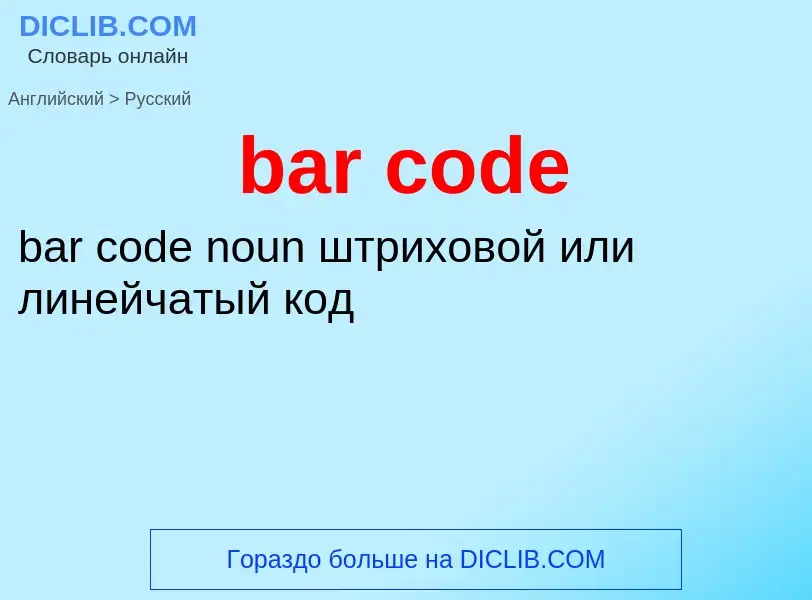Translation and analysis of words by ChatGPT artificial intelligence
On this page you can get a detailed analysis of a word or phrase, produced by the best artificial intelligence technology to date:
- how the word is used
- frequency of use
- it is used more often in oral or written speech
- word translation options
- usage examples (several phrases with translation)
- etymology
bar code - translation to English
['bɑ:kəud]
общая лексика
штриховой код
специальный код, в котором каждый знак состоит из вертикальных тёмных и светлых полос разной ширины, печатаемый на упаковке товаров, книгах и т.д. для автоматизированного ввода данных о них [в компьютерные системы]. Каждая группа линий штрихового кода представляет собой цифру от нуля до девяти. Имеется несколько систем штрихового кодирования
штриховой или линейчатый код (на упаковке товара для идентификации артикула оптическим просмотровым устройством)
существительное
общая лексика
штриховой или линейчатый код
Definition
Wikipedia
A barcode or bar code is a method of representing data in a visual, machine-readable form. Initially, barcodes represented data by varying the widths, spacings and sizes of parallel lines. These barcodes, now commonly referred to as linear or one-dimensional (1D), can be scanned by special optical scanners, called barcode readers, of which there are several types. Later, two-dimensional (2D) variants were developed, using rectangles, dots, hexagons and other patterns, called matrix codes or 2D barcodes, although they do not use bars as such. 2D barcodes can be read using purpose-built 2D optical scanners, which exist in a few different forms. 2D barcodes can also be read by a digital camera connected to a microcomputer running software that takes a photographic image of the barcode and analyzes the image to deconstruct and decode the 2D barcode. A mobile device with an inbuilt camera, such as smartphone, can function as the latter type of 2D barcode reader using specialized application software (The same sort of mobile device could also read 1D barcodes, depending on the application software).
The barcode was invented by Norman Joseph Woodland and Bernard Silver and patented in the US in 1952. The invention was based on Morse code that was extended to thin and thick bars. However, it took over twenty years before this invention became commercially successful. UK magazine Modern Railways December 1962 pages 387–389 record how British Railways had already perfected a barcode-reading system capable of correctly reading rolling stock travelling at 100 mph (160 km/h) with no mistakes. An early use of one type of barcode in an industrial context was sponsored by the Association of American Railroads in the late 1960s. Developed by General Telephone and Electronics (GTE) and called KarTrak ACI (Automatic Car Identification), this scheme involved placing colored stripes in various combinations on steel plates which were affixed to the sides of railroad rolling stock. Two plates were used per car, one on each side, with the arrangement of the colored stripes encoding information such as ownership, type of equipment, and identification number. The plates were read by a trackside scanner located, for instance, at the entrance to a classification yard, while the car was moving past. The project was abandoned after about ten years because the system proved unreliable after long-term use.
Barcodes became commercially successful when they were used to automate supermarket checkout systems, a task for which they have become almost universal. The Uniform Grocery Product Code Council had chosen, in 1973, the barcode design developed by George Laurer. Laurer's barcode, with vertical bars, printed better than the circular barcode developed by Woodland and Silver. Their use has spread to many other tasks that are generically referred to as automatic identification and data capture (AIDC). The first successful system using barcodes was in the UK supermarket group Sainsbury's in 1972 using shelf-mounted barcodes which were developed by Plessey. In June 1974, Marsh supermarket in Troy, Ohio used a scanner made by Photographic Sciences Corporation to scan the Universal Product Code (UPC) barcode on a pack of Wrigley's chewing gum. QR codes, a specific type of 2D barcode, have recently become very popular due to the growth in smartphone ownership.
Other systems have made inroads in the AIDC market, but the simplicity, universality and low cost of barcodes has limited the role of these other systems, particularly before technologies such as radio-frequency identification (RFID) became available after 1995.






 000130.jpg?width=200)



























![Snack vendor on the [[Shinkansen]] train scans a barcode. Snack vendor on the [[Shinkansen]] train scans a barcode.](https://commons.wikimedia.org/wiki/Special:FilePath/Snack vendor on the Shinkansen. 2005 (26321781190).jpg?width=200)


!["Wikipedia" encoded in [[Code 93]] "Wikipedia" encoded in [[Code 93]]](https://commons.wikimedia.org/wiki/Special:FilePath/Code93.png?width=200)
!["*WIKI39*" encoded in [[Code 39]] "*WIKI39*" encoded in [[Code 39]]](https://commons.wikimedia.org/wiki/Special:FilePath/Code39.png?width=200)

![[[Lorem ipsum]] [[boilerplate text]] as four segment [[Data Matrix]] 2D [[Lorem ipsum]] [[boilerplate text]] as four segment [[Data Matrix]] 2D](https://commons.wikimedia.org/wiki/Special:FilePath/Lorem Ipsum.png?width=200)

![High Capacity Color Barcode of the URL for Wikipedia's article on [[High Capacity Color Barcode]] High Capacity Color Barcode of the URL for Wikipedia's article on [[High Capacity Color Barcode]]](https://commons.wikimedia.org/wiki/Special:FilePath/High Capacity Color Barcode.png?width=200)

![detail of [[Twibright Optar]] scan from laser printed paper, carrying 32 kbit/s Ogg Vorbis digital music (48 seconds per A4 page) detail of [[Twibright Optar]] scan from laser printed paper, carrying 32 kbit/s Ogg Vorbis digital music (48 seconds per A4 page)](https://commons.wikimedia.org/wiki/Special:FilePath/Twibright Optar Detail Scanned.png?width=200)
![A [[KarTrak]] railroad [[Automatic Equipment Identification]] label on a caboose in Florida A [[KarTrak]] railroad [[Automatic Equipment Identification]] label on a caboose in Florida](https://commons.wikimedia.org/wiki/Special:FilePath/KarTrak code.jpg?width=200)




